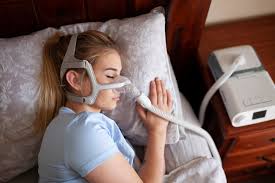
Continuous Positive Airway Pressure (CPAP) therapy has transformed sleep for millions living with sleep apnea. When used correctly, it keeps the airway open, improves oxygen levels, and restores deep, restful sleep. But not every CPAP experience is problem-free. If your CPAP mask isn’t fitted properly, cleaned regularly, or set up for your comfort, it may actually be doing more harm than good. Let’s look at the hidden challenges behind CPAP mask use — and how to fix them before they disrupt your therapy.
CPAP Mask Leaks and Poor Fit Can Disrupt Sleep
A poorly fitted CPAP mask is one of the most common causes of therapy failure. If your mask leaks, the pressurized air that should keep your airway open escapes — leading to snoring, dry eyes, or restless sleep. Even small leaks can make your machine overcompensate, causing more noise or air pressure changes that wake you during the night.
Over-tightening the straps isn’t the answer. It can cause red marks, discomfort, or headaches. Instead, try adjusting the fit or switching to a different style. Many users find relief with headgear-free masks like the Bleep DreamPort Sleep Solution, which seals directly to the skin — eliminating leaks and pressure from straps altogether.
CPAP Masks and Skin Irritation — The Hidden Hygiene Issue
Your CPAP mask sits against your face for hours every night. Without consistent cleaning, it can trap oil, sweat, and bacteria — leading to breakouts, irritation, or even infection. Dirty masks can also affect the integrity of the seal, causing more leaks over time.
To avoid these issues, clean your mask cushion and tubing daily with mild soap and warm water. Let all parts air dry completely before reassembly. Replace cushions every few months to ensure a soft, hygienic fit. Clean equipment supports both comfort and effective CPAP therapy.
Air Pressure Problems and CPAP Discomfort
If you wake up with bloating, dry mouth, or nasal congestion, your CPAP air pressure settings might be off. High pressure can make breathing feel unnatural, while low pressure may not keep your airway open effectively. Both scenarios can leave you feeling tired despite using your machine all night.
Many modern machines offer auto-adjusting CPAP (APAP) technology, which fine-tunes air pressure as you sleep. If discomfort continues, talk to your sleep specialist. Sometimes, a small adjustment or switching to a mask that better matches your sleep style — like a minimal-contact CPAP mask — makes a big difference in comfort.
Allergic Reactions and Mask Material Sensitivities
Not all CPAP users realize they may have sensitivities to certain materials in their masks. Reactions to silicone or latex can cause redness, itching, or a burning sensation where the mask touches the skin.
If this sounds familiar, try hypoallergenic CPAP masks made from soft, medical-grade materials. Using a fabric mask liner or gentle skin barrier can also help. At BleepSleep, our DreamPort system uses adhesive-sealed ports — ideal for people with allergies or skin sensitivities.
When CPAP Discomfort Becomes a Mental Hurdle
Physical discomfort isn’t the only barrier. Many users struggle emotionally with wearing a mask at night — especially if it feels bulky or claustrophobic. This can lead to partial use or avoidance of therapy altogether.
To make therapy sustainable, choose a CPAP mask that feels as natural as possible. Lightweight, headgear-free designs reduce anxiety and allow more freedom of movement, helping you stick with your therapy and enjoy better results.
How to Know When It’s Time to Replace Your CPAP Mask
Even the best CPAP mask wears out over time. Cushions flatten, straps stretch, and seals weaken, making leaks inevitable. If you notice persistent noise, skin marks, or reduced comfort, it’s probably time for a replacement.
Experts suggest replacing mask cushions every 3 months and the full mask every 6–12 months. Regular replacement ensures your CPAP therapy stays effective and comfortable — and that you get the restorative sleep your body needs.
Final Thoughts
Your CPAP mask should help you breathe easier, not create new problems. If you’re facing irritation, leaks, or discomfort, don’t ignore them — small adjustments or the right equipment can completely change your sleep experience.
At BleepSleep, we believe CPAP therapy should be simple, comfortable, and effective. Our innovative DreamPort Sleep Solution eliminates headgear, leaks, and discomfort, offering a new level of freedom and better rest for every user.
